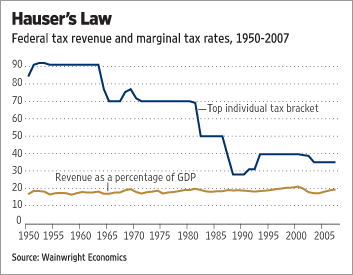Why Income Tax Rates Should Be Lower
[I wrote this article earlier and WordPress messed up and deleted most of it. I had to rewrite the final 2/3 of this article. I think I wrote it better the first time, but enjoy.]
I am not going to get into the philosophical reasons why I am opposed to income taxes in this piece article. I am however going to explain why lower tax rates are better than higher tax rates.
Here is a chart that was sent to me by Mike at The Young Conservative Blog. It shows the highest federal individual income tax rate. It also shows the tax receipts received by the federal government as a percentage of GDP.
[Check out Mike’s blog, theres a lot of interesting stuff there. Also, here is a Wall Street Journal article about Hauser’s Law.
I think this is pretty remarkable. While the highest individual income tax rates in this country dropped from 91% down to 28%, and then rose back up to the current 35%, tax receipts as a percentage of GDP has remained at a fairly stable level of 19.5%. Cutting the rates from 91% to 70% in a few years didnt really affect the receipt rate, nor did increasing them from 28% to 40% in a few years.
Now, you might say that the reason that the tax receipts as a percentage of GDP remain pretty much the same is that when taxes on the rich are cut, the tax burden falls more heavily on the poor. However, you may recall the chart that I posted regarding tax burden. I was able to find an acrhived copy of the chart that the government removed from its website here. I dont know how long it will stay up.
This chart clearly shows that the rich have paid an increasing portion of the total income taxes collected since 1979.
In 1979, the top income tax rate was 70%. The government collected about 19.5% of GDP through income taxes, and the top 20% of wage earners paid 64.9% of all income taxes. The top 40% of wage earners combined paid 85.1% of all income taxes.
In 2005, the last year for which data is available, the top tax rate was 35%. The government still collected about 19.5% of GDP through income taxes, however, the top 20% of wage earners now paid 86.3% of all income taxes (a higher percentage than was paid by the top 40% of wage earners in 1979), and the top 40% of wage earners paid 99.4% of all income taxes collected.
I know this seems counterintuitive, but cutting taxes on the rich–and all Americans–actually increased the tax burden on the rich. 2005’s top tax rate (35%) was exactly half of what the top tax rate was in 1979 (70%). Yet, the rich paid a much higher percentage of income taxes in 2005 under a lower tax rate than they did in 1979 under a higher rate.
As I mentioned in a previous post, I found this spreadsheet when I was trying to prove to someone that President Bush’s tax cuts favored the rich and hurt the poor. I was wrong. In 2000, the top 20% of earners paid 81.2%of all income taxes. By 2005, this proportion had grown to 86.3% of all income taxes. The tax burden of the top 40% increased from 94.7% in 2000 to 99.4% in 2005. In fact, every quintile in the “bottom 80%” of wage earners paid a smaller proportion of the total income taxes in 2005 than they did in 2000. Broad based tax cuts benefit all wage earners.
Cutting taxes allows Americans to keep more of their hard earned money. This in turn leads to increased spending, savings, and investment. These three factors lead directly to increased GDP growth. Increased GDP growth means higher tax revenue for the government (which will always collect around 19.5% of GDP through income taxes).
I have already demonstrated that the government will collect roughly the same percentage of GDP–19.5%–through income taxes no matter what the top tax rate is. This is true whether that rate is 92% or 28%. I have also demonstrated that cutting taxes on the rich and all Americans has actually increased the tax burden on the rich. Finally, I have explained that cutting taxes leads to higher GDP (which equals higher tax receipts).
I see no further arguments against cutting taxes on all Americans including the wealthy.
Rather than raising the tax rates on the wealthy back to what they were in 2000, the President and Congress should consider drastically cutting income taxes for all Americans. This will lead to increased economic growth which will in turn lead to higher tax revenues for the government. Most importantly, doing this would allow all Americans to keep more of their hard earned money.
Americanly Yours,
Phred Barnet
Please help me promote my site:





